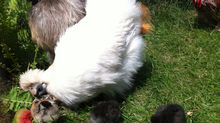Nutrition - The Importance Of Vitamins To You And Your Dog
- Grumpy Chicken
- Dec 8, 2016
- 13 min read

Nutrition is a key part of all of our lives and no less so when it comes to our pets. There is a wealth of information on the internet when it comes to pet nutrition but from what I've found it can be a bit of a jumble with some articles covering bits, others covering other bits and ooodles of contradictions. This post is my attempt to bring a little more clarity to all the key bits I've learned along the way that you as a pet owner should know.
Whether you buy or make your pet food it is important to have an idea of how vitamins and minerals can effect your pets health and how to spot the potential signs of an imbalance in these nutritional building blocks. Store bought pet food is a good starting place to build from but unless you spend a fortune on specially formulated food plans your dog/cat/chickens/rabbit etc. are probably in need of some nutritional supplementation in order to ensure that they get everything that their growing bodies need to remain healthy, happy and illness free.
It is important to start with to find out exactly what nutrition your pet requires, for example the needs of a dog can be quite different in some respects than that of a chicken or a cat. Foods that are perfectly safe for dogs can be quite dangerous for chickens etc. and vice versa so it is vital to make sure you have your facts straight before jumping head first in to supplements.
I'm going to start with dogs as with Bays various health issues over the past 3 years canine nutrition is something that I've had to spend a lot of time exploring and vitamins is as good a place as any to begin. Please note, however, that whilst I hope this information is useful to you, i am not a trained nutritionist, medical practitioner or veterinarian so please consult a doctor/vet before making significant changes or considering over the counter supplementation for you or your pet.
Dogs (and us humans too) require 13 different vitamins as part of their balanced diet in order to grow and develop normally. Each of these require a careful balance within the body, too much and our bodies develop a range of symptoms to tell us that we've got it wrong and the same if our levels drop too low and this is no different no matter what your species.

1. Vitamin A
Vitamin A is very important for a whole range of things such as vision, the reproductive system and cell reproduction in general. Beta carotene is the precursor to vitamin A (meaning that it is broken down and absorbed as vitamin A) and it is excellent at helping to fight off the disease causing 'free radicals' inside of our cells. You will find Beta Carotene in most colourful vegetables such as carrots, broccoli, spinach and sweet potatoes and also in milk products (like cream and cheese) organ meats (liver, kidney etc.) and fish oils.
Vitamin A Toxicity - This vitamin is fat soluble which means that too much of it and the body will accumulate it in the liver causing hypervitaminosis (Vitamin A toxicity) This can cause blurry vision, bone pain, breathing difficulty, changes in immune function, chronic inflammation of the liver, cracked fingernail & lips, depression, fever and a whole assortment of other unpleasant things which at the worst extremes can prove fatal.
Vitamin A Deficit - can cause dry eyes, night blindness, dry bumpy skin, hair loss and in severe cases loss of vision and even death.
As you can see maintaining the balance here is key for both you and your pets. It is very hard to determine an exact amount to supplement your pets diet but something like 1-2 bite sized portions per day of these vitamin A rich foods (for example two broccoli florets coated in olive oil and grilled until tender) seems to be the general thinking but please consult your veterinarian for a more in depth evaluation based on your pets size, weight, breed etc. and remember with veggies you will need to lightly cook them to break down the cellulose so that your dogs digestive system (which is a lot faster than us humans) is able to absorb all of the nutrients on the way through.

2. Vitamin B1 (Thiamine)
Vitamin B1 is used by the body to process carbohydrates and turn them in to useable energy. Is also is a key ingredient for proper nerve and cell function. Shop bought breads and cereals are often fortified with Thiamine but it can also be found naturally in foods such as whole grains, fish, lean meats and dried beans (never feed dried beans to yourself of your pets as dried legumes can often contain toxins and must either be soaked for several hours to leech out these toxins, cooked or maybe even both before they are safe for consumption)
Vitamin B1 Toxicity - this one is less of a worry as overdosing is extremely rare. B1 is a water soluble vitamin meaning that any excess should be flushed out of the body naturally in the urine. Signs of an overdose can be an upset stomach and in rare cases it can cause an allergic reaction with side effects ranging from skin irritation to nausea, dizziness and shortness of breath.
Vitamin B1 Deficit - can cause anorexia, rapid weight loss, poor appetite, colitis, nerve damage or inflammation, fatigue, short term memory issues, muscle weakness and cardiovascular issues such as an enlarged heart which can be very dangerous.
Again consulting with your veterinarian is the best way to assess any potential imbalance in your dogs diet and the dosage needed to rectify it but personally I give Baylea fresh/frozen fish 2-3 times a week and the occasional piece of toast as a treat and this seems to be working well for us.

3. Vitamin B2 (Riboflavin)
Vitamin B2 or Riboflavin helps in the production of red blood cells and is very important for proper growth and supporting the metabolism. It is found in foods such as beef liver, lamb, milk & natural yogurt, mushrooms, spinach and sun dried tomatoes. At this point I think we are starting to see a clear picture of why feeding your dog the same old type and flavour of processed tinned food every day/week/month can be very detrimental to doggy health.
Vitamin B2 Toxicity - rarely causes side effects or toxicity (as it is also water soluble) but possible side effects could include sun induced eye damage, itching or numbing sensations and orange tinted urine.
Vitamin B2 Deficit -can cause dry red tongue (called magenta tongue) skin rash, anemia, weakness and fatigue, red, sore, watery eyes, blurred vision or light sensitivity.

4. Vitamin B3 (Niacin)
Vitamin B3 is a key player in controlling cholesterol levels , processing alcohol (not a function your dog should really need it for!!) maintaining healthy skin and converting carbohydrates in to energy. White meat, peanuts, mushrooms, liver, tuna and green peas are some of the foods that you can choose from to find a good source of B3.
Vitamin B3 Toxicity- Another water soluble vitamin it is difficult to get too much niacin from food alone but if you do suffer B3 toxicity the symptoms can include severe skin flushing combined with dizziness, rapid heartbeat, itching, nausea and vomiting, abdominal pain and an upset stomach.
Vitamin B3 Deficit - Can lead to indigestion, fatigue, canker sores, vomiting and depression.

5. Vitamin B5 (Pantothenic Acid)
Vitamin B5 serves several bodily functions including converting fats in to energy and the synthesis of cholesterol. Several studies are currently underway to expand on the initial findings which may indicate that pantothenic acid can be used to lower bad cholesterol and increase good cholesterol within the body. Named for the Greek root 'pantos' literally meaning 'everywhere' pantothenic acid is easily available in a huge array of different foods. It is worth noting , however, that vitamin B5 is destroyed during processing so fresh unprocessed foods (like home grown veggies) are much higher in it than those that come from a tin or your freezer. Some of the more rich sources of B5 are brewers yeast, corn, kale, broccoli, tomatoes, beef organ meats (liver and kidneys) Salmon and sweet potatoes.
Vitamin B5 Toxicity - Is incredibly unlikely, in fact so much so that no upper limit for the intake of this vitamin has yet been established. In theory, however, if you were to somehow ingest a large enough dose the only symptom you might expect to suffer is a mild stomach upset.
Vitamin B5 Deficit - B5 deficiency is quite rare but may include symptoms such as fatigue, insomnia, depression, vomiting, irritability, stomach pains, burning feet and upper respiratory infections.

6. Vitamin B6 (Pyridoxine)
Vitamin B6 is a very important player in both physical and emotional well being. I think of it as the happy vitamin as it is key in the production of hormones such as serotonin, melatonin and dopamine. All of these hormones are all neurotransmitters helping to play a part in how you and your dog feel on a day to day basis. They effect your sleeping and waking patterns (so help reduce insomnia...and yes dogs are just as prone to insomnia as us humans when there is something worrying them) as well as mood, sexual desire and function, memory and learning, some social behaviors, reward based behavior (essential in keeping your canine friend motivated and on top of his/her training) B6 even helps to regulate your temperature which can effect your overall comfort level greatly especially during the hottest and coldest times of the year. Some foods high in B6 are bran (rice), pistachio nuts, tuna, beef liver, sunflower seeds, watermelon, potatoes, chickpeas, bananas and spinach.
Vitamin B6 Toxicity - Again B6 is water soluble and any dietary excess should pass out in the urine with no ill effects but if supplementation is too high and prolonged toxicity can result in neuropathy (pain or numbness in the extremities) and in severe cases difficulty walking.
Vitamin B6 Deficit - Can be responsible for various skin disorders and rashes, certain types of anemia, confusion, nausea and depression as well as potentially making it harder to fight off any infectious diseases that might come along.

7. Vitamin B7 (Biotin)
This vitamin is once again essential in the metabolism of carbohydrates, fatty acids, amino acids and glucose. It also helps to maintain a healthy nervous system, strengthens hair and nails/claws, supports the bodies adrenal function (helping to control blood sugar and respond to illness and injury amongst other things) Foods rich in biotin include, but aren't limited to, egg yolks, meat, bread, broccoli, cauliflower, mushrooms, nuts, corn, wheat bran, potatoes and spinach.
Vitamin B7 Toxicity - Again water soluble so cases of toxicity are extremely rare but be aware that biotin can have adverse reactions when mixed with certain medications so always double check with a professional first.
Vitamin B7 Deficit - can cause vulnerability to fungal infection, skin disorders, muscle pain, fatigue, certain birth defects, brittle hair or hair loss and mild depression.

8. Vitamin B9 (Folic Acid)
Folic acid is a vitamin that I am sure many of us have heard of before (especially in reference to female health and pregnancy) While it remains true in both humans and dogs what folic acid can help to prevent certain birth defects and promotes proper growth and wellness it has several other less well known functions. It is also crucial in proper brain function and mental and emotional health. B9 assists the body in preventing heart disorders and strokes (and even, albeit theoretically at present, cancer) It helps to form blood cells, build muscle and helps your cells function in the way that they should.
Some foods containing reasonable quantities of Folic Acid are dark leafy greens (such as kale, spinach, collard greens and turnip tops) broccoli, citrus fruits, legumes (beans, peas etc. and of course the most fabulous sprouted lentils!) most members of the cabbage family (like the dreaded sprouts!!) , cauliflower, seeds and nuts, beets (also a wonderful antioxidant) and romaine lettuce (Bay won't touch lettuce not when there is crunchy cabbage to be had but you never know your dog may love the stuff!!)
Vitamin B9 Toxicity - Water soluble again B9 is not considered toxic even in higher doses across the medical profession but potential symptoms could be stomach problems, sleep deficiency, skin reactions and maybe even seizures so as with all other vitamins it is best to stick to the recommended amount (see your vet for further clarification)
Vitamin B9 Deficit - Another of the more widespread deficiencies across the world symptoms can include anorexia, difficulty breathing, mood disorders, gastro-intestinal issues, headaches and palpitations.

9. Vitamin B12
B12 is a crucial player in the replication of DNA which, as i'm sure you are aware, is a key component in all living organisms which makes it even more concerning that it is thought to be one of the most prevalent nutritional deficiencies in the world today. This vitamin also helps in nerve cell regulation, keeping you nerves healthy as well as maintaining each nerves protective (myelin) coating. Without this coating nerves cannot transmit electrical signals properly (in fact this is exactly what happens to the nerve cells of a person suffering from neurological diseases like multiple sclerosis) Scary stuff i know!!
Along side of this B12 has a profound effect on all cognitive function, digestion and heart health (as all rely on the electrical signals sent from the brain to maintain normal function) B12 can be found in foods such as shellfish, fish, crab, red meat, cheese, eggs and certain soy products.
Vitamin B12 Toxicity - As a water soluble vitamin B12 is also very hard to overdose on (although certain individuals in rare cases can suffer from an allergy to B12) symptoms of toxicity may include numbness and tingling in extremities such as hands and face, skin problems (rashes and reddening of the skin) nausea, lowered potassium levels (potentially triggering forms of arthritic pain and effecting heart function) and difficulty swallowing amongst other issues.
Vitamin B12 Deficit - Can cause weakness/fatigue, heart palpitations and difficulty breathing, pallid complexion, smooth tongue, numbness & tingling and in severe cases difficulty walking and loss of sight.

10. Vitamin C (Ascorbic Acid)
Vitamin C is, without question, the vitamin we come across most in day to day life. We all reach straight for the Vit C at the first sniffle as its reputation as a cold preventative immunity booster is very widespread indeed . The view on Vitamin C's usefulness in out canine companions is, however, still a matter for great debate. One camp states that dogs don't need vitamin C in their diets as they, quite truthfully, have a natural ability which humans don't in that their bodies can produce their own internal source of vitamin c.
The other camp (of which I am a member) notes that, while this is true for all healthy young dogs in their prime, older, injured or stressed dogs have also been proven to quickly deplete their internal stockpiles of this vitamin. This is not a good thing as vitamin C is very good when it comes to healing wounds, boosting the immune system and fighting off disease which is especially needed in all of the above situations.
Various studies have been carried out and have indicated that dogs given a regular supply of vitamin C show a notably improved immune response and as well as fighting existing illness this also helps in a preventative way. In addition it is suggested that just prior to and just following vaccinations a good dose of vitamin C can bolster the white blood cells, helping to mitigate possible side effects and helping your dogs body to properly react to the vaccine and protect itself against future attacks.
Some of the best sources of Vitamin C are canteloup (one of Baylea's favourites - but beware too much, especially with the rind, can upset the stomach) watermelon, bell peppers (especially yellow ones) dark leafy greens, broccoli, tomato and peas.
Vitamin C Toxicity - Water soluble again so worst case scenario probably involves nausea and an upset stomach.
Vitamin C Deficit - Especially in the old and infirm can open the door to secondary infections as well as impeding a swift recovery.

11. Vitamin D
The D Vitamin group (most importantly D2 and D3) are essential for the absorption of calcium which is vital to healthy teeth and bones. These are the sunlight vitamins in that our, and our dogs (plus tortoises and reptiles in my case) can manufacture our own vitamin D after exposure to natural sunlight. This is one of the many reasons that it is good to get both you and your dog out and about in the nicer weather. Sunlight is the main source of Vitamin D as there are only a few dietary sources to choose from. Mushrooms and fish liver oils (such as cod liver oil) are good sources of this vitamin but please note it is destroyed in the cooking process so cooked fish will have far less content. For Baylea I include the odd mushroom diced in his food but his main source (aside from getting out in the sunlight) is either over the counter cod liver oil capsules or a little of the same but from a bottle drizzled on his dinner (he likes both but the capsules are more fun and entertaining for him and he gets the goodness as well as about half an hour of throwing it in the air and then chasing it around the room)
Vitamin D Toxicity - excessive vitamin D (fat soluble rather than water) can be quite dangerous causing a build up of calcium in the blood and symptoms such as poor appetite, nausea, sickness, muscle fatigue, frequent urination and eventually serious kidney problems.
Vitamin D Deficit - can cause rickets (soft bones and skeletal deformities) and confusion amongst other things.

12. Vitamin E
This vitamin supports the skin and immune system helping to maintain healthy function as well as being effective at combating free radicals (unstable highly reactive atoms or molecules formed within the body that can cause damage including but not limited to the aging process, cancers and inflammation of the skin as well as being very detrimental to our internal tissues on the whole) Good sources of Vitamin E are nuts and seeds, leafy greens, corn and wheat germ.
Vitamin E Toxicity - (fat soluble) Can increase the risk of bleeding problems as it acts as an anticoagulant as well as muscle fatigue, nausea and diarrhea.
Vitamin E Deficit - rare but can cause poor nerve transmission, loss of sight by degeneration of the retinas and muscle fatigue.

13. Vitamin K
Last but certainly not least, Vitamin K is another fat soluble vitamin so careful balance is key but its job is just as vital in that it aids the body in helping blood to clot as it should in cases of injury. This prevents excessive and uncontrolled bleeding which, needless to say, can be very dangerous to humans and dogs alike. Best sources of this vitamin include, once again, leafy greens (got to love that kale!!) cabbage, broccoli, prunes, dried basil and cucumber.
Vitamin K Toxicity - Natural forms of fat soluble Vitamin K are not considered toxic as such but its synthetic water soluble counterpart 'Menadione' (often found in over the counter supplements and baby formula) can cause toxicity and should not be used.
Vitamin K Deficit - Deficiency is rare with this one but some signs could be random bleeding, bleeding of the gums (this can most often be bad dental hygiene too so check that out first with your vet) and difficulty clotting. It is most common (although still rare) in infants.

Ok so I'm sure your head is spinning by this point but i hope that you have found this article helpful and please remember that if you think that you or your dog are suffering with any of the above symptoms of a vitamin imbalance then the first stop for both of you should be with an appropriately qualified medical professional and not the local supermarket!! This article is simply an overview to help us all in the better understanding of the dietary requirements that you and your four legged friend need to stay in tip top health and the impact that any imbalance can have on all of us if we don't pay enough attention to what we eat. Good luck and keep well :}












































Comments